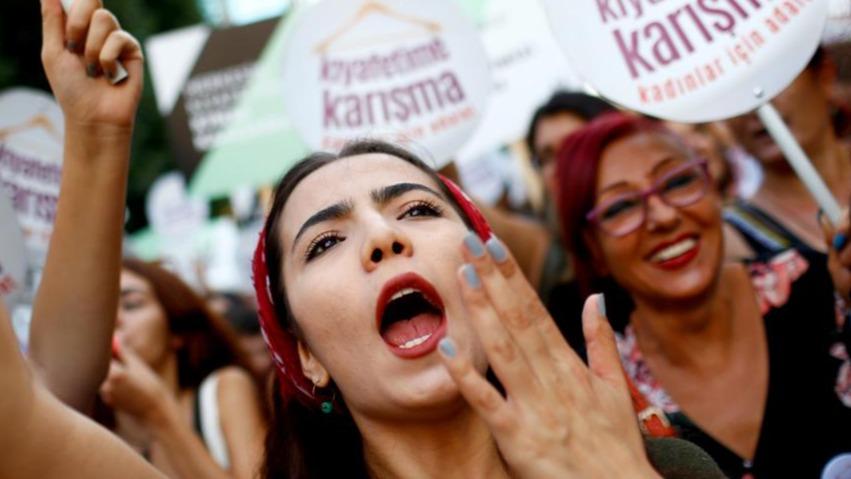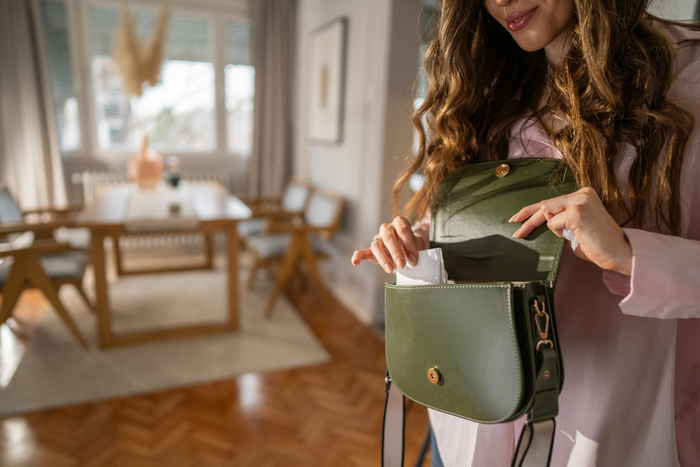It was a summer morning in 2016. Her stomach knotted and her head mush, like every new moon, Merve Bakir first took off her gloves, then her protective glasses.
Consumed by pain, she went knocking on the door of human resources at Valfsan, the factory that has employed her for five years.
Her nose glued to her computer screen, the chief manager raised her head: "Do you want a period leave?"
“I thought I had heard the wrong thing!” recalls the Turkish worker amid the hubbub of the machines.
The work cap screwed on her long brown locks, she still laughs at the scene, sitting behind the assembly table of spare parts for cars.
“What I did not know, she continues, is that a few hours earlier, the management had just integrated into its collective agreement a monthly rest day for painful periods!”
A mini-revolution in a Turkey where women's rights are in constant decline.
“Before, most employees suffered each month in silence for fear of being laughed at by their colleagues.
At best they evoked a “special day”.
From now on, they dare to use the word “rule”, and can benefit from a day of rest paid by the company”, triumphs Berrin Topal, the ex-unionist at the origin of the new initiative.
Read also"A false good idea": why some feminists are against menstrual leave
In video, "MENstruation": what if everyone had their period
State machismo
In his vast glass office perched above the production line, the director of Valfsan Orhan Yeloğlu, confess without blushing, "I laughed the first time I was introduced to the project.
I did not understand anything! "
In the industrial area of Tuzla vast constellation of factories nestled on the Asian side of Istanbul, sexist and harassment are the norm in the workplace.
But Orhan profitable advantage to its employees: his daughter works at his side.
"Very quickly I got myself together," he continues.
"In this part of the world, it never ceases to evoke the sacredness of women under Islam, but in reality it is often treated like a second class citizen, says Adnan Taşkin, his partner.
We said: establish a menstrual leave it '
is to fight the prevailing hypocrisy".
Official speeches fuel this hypocrisy: once a champion of European-style openness, President Erdogan outbids it a little more every day, comparing abortion to a "crime against humanity" or reminding women of their role as procreators. .
Full screen
Berrin Topal, a former trade unionist, is behind the menstrual leave introduced in the Walfsan factory.
Nimet Kirac
A year ago, the Turkish reis withdrew his country from the International Convention of Istanbul, supposed to protect them from male violence, on the pretext that it would threaten family values.
Today, the role of Turkish women is considered only through a religious, macho or nationalist prism – an ideal pretext to discredit women activists, accused of being in the pay of the West.
In this context, anything related to sex or female intimacy is passed over in silence – or, worse, the object of the greatest contempt.
At the start of the first wave of Covid, in March 2019, sanitary napkins had thus disappeared from the shelves of many supermarkets, the authorities having failed to specify that they were part of the so-called “first necessity” products.
However, the rules revolution is underway.
Unthinkable a few years ago, menstrual leave was introduced in 2019 at the bar of Izmir, on the shores of the Aegean Sea, as well as within the Union of Journalists of Turkey (TGS).
“Positive discrimination”, according to the current expression, has also inspired several municipalities.
In Tunceli, in the east of the country, the communist mayor Fatih Mehmet Maçoğlu took action at the end of 2019. For this fierce opponent of Erdogan, "there is no progress without equality between the sexes”.
There is no progress without gender equality
Fatih Mehmet Macoglu
According to a survey conducted last June by his team, the sixty employees questioned said they had used their new right to menstrual leave at least once.
Even if, concedes Saadet Coşkun, the official in charge of the investigation, mentalities will not change overnight: “Most of the women surveyed report that it is not them but their hierarchical superiors who set the date of leave.
In addition, they still admit to being mostly hesitant to file a request directly, favoring text messages or the intermediary of a friend to avoid the mockery of their colleagues.
Full screen
In Tnceli, the communist mayor Fatih Mehmet Maçoglu has also set up a menstrual leave.
Bulent Kilic/AFP
Fighting against this persistent taboo is the goal that Ilayda Eskitaşçioğlu has set herself.
The 28-year-old lawyer, doctoral candidate in law at Koç University in Istanbul, is the founder of We Need to Talk, an NGO that fights poverty and period-related stigma.
The idea came to him by chance, in 2011, during the earthquake in Van, in eastern Turkey.
To come to the aid of the decimated populations, she and her family hasten to fill four boxes with food, clothing and children's toys.
“Once the packages were shipped, I was suddenly taken with immense remorse: we had omitted to add sanitary napkins for the women!
How could we have forgotten such an indispensable product?
We immediately rectified the situation by preparing a new package,
Two years later, the young woman was once again flabbergasted, this time learning that the Turkish Language Institute had just updated its dictionary by adding to the definition of the word "dirty" (
kirli
) having her period.
"What a regression!
Imagine the psychological impact on the girls!” she protests.
From then on, the subject becomes an obsession.
In 2016, she took action by creating her NGO.
The beginnings are timid.
“To finance the project, we started selling homemade cakes with friends from high school.
The logo was designed by a friend,” she recalls.
But Ilayda sees big for the new generation: “From the start, I identified three particularly precarious categories: seasonal workers in the agricultural fields, Syrian refugees and pre-adolescent girls in rural and marginal areas.”
Its purpose: to meet them by combining the distribution of sanitary products and awareness campaigns.
"In Turkey,
a survey recently revealed that 82% of families affected by extreme poverty do not have enough to buy sanitary napkins.
Often, simple tree leaves or newspaper will do the trick.
With the economic recession and the rampant inflation, the situation is only getting worse,” she adds.
Precariousness and taboos
From villages to underprivileged suburbs, Ilayda becomes aware of an even greater taboo than she imagined: “A mixture of shame, fear and ignorance surrounds the question of rules.
At home, it's a subject that we keep silent about."
Not to mention the medieval traditions, which only aggravate the stigma.
“In some Turkish families, but also Syrians, it is still customary to slap girls during their first period.
According to old religious beliefs, it is a way of reminding them that they are now women.
It's called 'the first slap',” she explains.
“But the problem goes beyond Islam.
The problem is above all patriarchal.
In our country, the majority of decisions are still made by men who do not
This young sociologist, who made menstruation in Turkey the subject of her doctorate at Boston University, no longer counts the number of insults received on social networks.
“On the We Need to Talk Twitter page, we openly talk about LGBT issues, or even masturbation to ease period pain.
Our outspokenness disturbs, especially when the question is approached from a sexual point of view”, she regrets.
On the pitch, the pressure is even more palpable.
“One day while we were campaigning in Adana, in the south, two locals chased us to chase us away accusing us of being immoral,” recalls Ilayda.
Full screen
Ilayda Eskitasçioglu, left, during an action to raise awareness of the rules of her association, We Need to Talk.
Picasa
Nothing, however, stops this powerful duo.
In six years, an incredible network of volunteers has woven across the country, bringing together activists, doctors, but also manufacturers of sanitary napkins who supply them free of charge.
Among them, a few men, including locals.
“Once, Ilayda still remembers, we parked our car in front of a cafe.
Residents accosted us: “What are you doing here?”
A little nervous, I replied that we were going to meet girls to talk to them about menstruation.
First there was a silence.
Then, the oldest resumed: “But that's very good!
You know, I have granddaughters who might find this useful.
We will help you carry your boxes!”
I couldn't believe it.
In addition, coincidence of fate, the village was called Ymurtalik,
“ovaries” in Turkish!”
In more conservative areas, caution is obviously still in order.
"Sometimes we hide the towels in black plastic bags to go unnoticed," she says.
Full screen
A March 8 in Istanbul: one of the signs proclaims “Right to free tampons!”
Marie Tihon
Over time, perseverance pays off.
Influenced by We Need to Talk, students from Kadir Has (Istanbul) and Bilkent (Ankara) universities have just installed towel boxes on their campus, a kind of free self-service inspired by a Turkish translation which consists of hang bread bags for people in need.
The question of menstruation, so long suppressed, finally made its way to Parliament: in January 2021, opposition MPs submitted two bills calling for free hygienic products for disadvantaged populations and a reduction in the exorbitant tax (18%, or as much as for caviar and diamonds!) which they are subject to.
Unexpected victory: at the end of March 2022, the government agreed to reduce the tax to 8%.
That day,
Ilayda cried with joy.
"It's only a small symbolic advance in the midst of soaring prices, but it's proof that our mobilization is bearing fruit," she rejoices.
May 28 marks the 8th World Menstrual Hygiene Day.







/cloudfront-eu-central-1.images.arcpublishing.com/prisa/QZBKEHFL6RHI5FSPQNNBZGIIUA.jpg)

/cloudfront-eu-central-1.images.arcpublishing.com/prisa/4XEFCJJ6OBGEVN2626XOLJD47Y.jpg)





